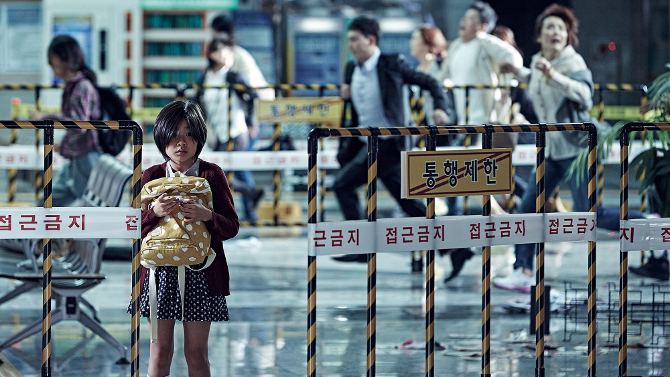Claustrophobia is a key component of the zombie horror sub-genre. Though the whole wide world may be the protagonist’s playground, there is something ultimately daunting about having millions (maybe billions) of the world’s population transformed into deadly infected corpses – each one drawn to those few still attempting to survive, encroaching on their oh-so-important space.
This concept is pushed to its most tense breaking point in the 2016 South Korean horror film Train to Busan, co-written and directed by Sang-ho Yeon. As you may have guessed from the title, most of the story takes place on a confined, tightly packed train (a perfect setting for this type of flick).
The narrative’s driving force is a father/daughter pair living in Seoul, Seok-woo (Yoo Gong) and Soo-an (Soo-an Kim). Having recently separated from his wife, the family is in disarray. It is a complicated matter in which Seok-woo, a self-centred individual, sees himself as a sort of selfless father and husband, working insane hours as a fund manager for the betterment of his family. His daughter (and wife – we must surmise), see him as a non-existent patriarch – selfish and caring about no one but himself.
After missing Soo-an’s recital and wholly failing at getting her an appropriate birthday present, she simply wants to take the train to visit her mother. Caving, the duo head to the station, joining a packed locomotive which includes a highschool baseball team/cheerleader (centred around a couple in young love, played by Woo-sik Choi and Sohee), a husband, Sang-hwa (Dong-seok Ma) and his pregnant wife, Seong-kyeong (Yu-mi Jung), a brash, abrasive, egotistical businessman, Yon-suk (Eui-sung Kim), a homeless wanderer (Gwi-hwa Choi) as well as two elderly sisters, In-gil (Soo-jung Ye) and Jong-gil (Myung-sun Park).
Taking a page from Danny Boyle’s zombies in 28 Days Later…, the infected are not the slow, lackadaisical ones of yesteryear, but move like they are competing for a gold medal in the 100 metre dash – plus, after tainting other humans, the new zombies spring up, snapping into violent, fast-moving action in an utterly short time frame.
Building suspense from the very beginning, we know that by the time everyone has entered the train, things are going to turn bad fast. Of course, one of the quick moving zombies boards, and chaos ensues one car at a time. Soon, the survivors are trapped, slowly realizing that the infected only attack if they can actually see humans, and they also struggle in the darkness.
With news being sporadic and untrustworthy, it seems like each stop they pass is filled with the beastly creatures – is there any safety in the suddenly upside down world? Eventually, the conductor receives word that a location up ahead is being protected by the military, so he heads for the supposed safety. Will those few survivors band together and find a way out? Will the father/daughter pair be able to work together, learning from each other as they fight for their lives?
At its heart, Train to Busan speaks to how we deal with a chaotic situation. Do we take others in, working together to aid both strong and weak, young and old? Or, do we go it alone, caring about no one other than ourselves? We see both in a variety of characters, and it is perhaps best exemplified in our lead, Seok-woo, who despite his survival instincts, is slowly swayed to a less self-centred perspective by the kind, caring, open-hearted ways of his young daughter. It is his loving child that, despite the bedlam, still respects elders and looks to help those in even the most dire of circumstances. It is intriguing to watch their story unfold over time.
Visually arresting and filled with some superb set pieces, there are many tense, bone-chilling moments. One finds the survivors departing the safety of their train, meandering through an eerily empty station, looking for refuge in a place that oozes unease. Another finds half of the group separated from the others, forcing them to brave the cars of the infected to save their trapped compatriots. Combining intense action and sneaky subterfuge, we are completely invested in their dangerous trek. Perhaps the film’s peak finds the survivors blocked on the tracks, forcing them to make the most terrifying transfer in the world and boot it to another possibly free train.
A superlative addition to the modern zombie roster, Train to Busan takes the viewer on a wild ride that is going nowhere good fast. Tense, taut and horrifically thrilling, Sang-ho Yeon concocts a film that feels fresh in a market that has recently been oversaturated following The Walking Dead craze. Partly due to the heart found at its ‘coming together to overcome adversity’ message, its characters are rich and show the very best and utter worst that those of planet Earth have to offer. Though generally more of a horror spectacle, there is some artistry at work here – with one emotional demise using flashbacks as well as shadow and light to depict the death in a subtle and heartfelt way. All aboard; ride these tracks to discover a motion picture that just may provide us with some light at the end of the proverbial tunnel.

